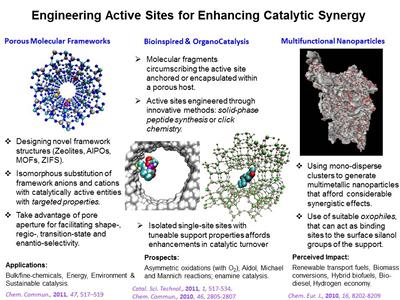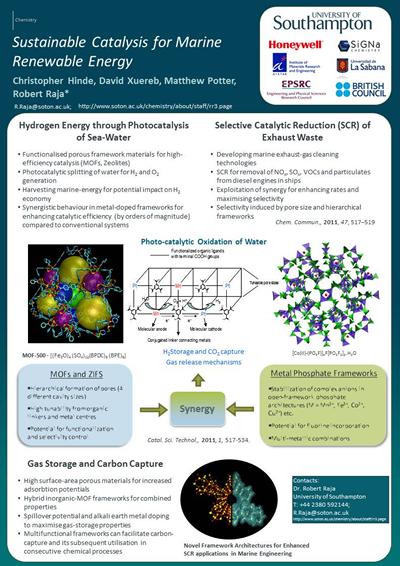Professor Robert Raja MSc (Hons), PhD, FRSC
Professor of Materials Chemistry and Catalysis, Deputy Head of School Research and Enterprise,Co-Chair Clean Carbon Strategic Group

- Related links
- ResearcherID
- ORCID
Robert Raja is Professor of Materials Chemistry and Catalysis at the University of Southampton and Chief Scientific Advisor of ViridiCO2, a spin-out company from the Raja lab.
Robert joined the University of Southampton in June 2006 as a Reader in Chemistry and his career includes appointments at the University of Cambridge (1999-2006), Bayer Chemicals, Germany (joint appointment, 2001-2003) and Royal Commission 1851 Exhibition fellowship at the Royal Institution of Great Britain (1997-1999).
The focal theme of research within his Group entails the discovery, design and fabrication of novel catalytic materials, for application as single-site heterogeneous catalysts, in chemical, pharmaceutical, fine-chemical and environmental sectors for developing sustainable technologies. The diversity of his research has also been pivotal in establishing a predictive design platform for the discovery of advanced catalytic materials, expanding scope to the rational design of hybrid materials and photonic fibres for hydrogen generation and CO2 storage and utilisation.
His research includes funding from UKRI (EPSRC), Royal Society, European Commission Horizon 2020 programme, core membership to the EPSRC UK Catalysis Hub as a co-investigator, and framework grants with industrial partners (Total Research and Technology (Europe), Honeywell (USA), UOP (USA), Signa Chemistry (USA), Bayer (Germany)). His research has been instrumental in licensing catalytic technology to the chemical and pharmaceutical industries and his IP portfolio in the sustainable manufacture of polymers and nylon is being developed for pilot studies.
Author of over 225 research publications in peer-reviewed journals (h-index =46) and inventor on 50+ International Patents.
Notable accolades include: The 2020 Emerging Technologies Award in Energy and Environment (Royal Society of Chemistry), The Honeywell Inventor Award, Erskine Fellowship awarded by the University of Canterbury (New Zealand), the Santander Universities Entrepreneurial Award, and the Barrer Award by the Royal Society of Chemistry ‘in recognition of outstanding contributions to preparative materials chemistry and their application to industrial catalysis’. He is also a Visiting Professor at several universities worldwide.
Current Research Projects
Multi-inlet comprehensive gas chromatography and high resolution mass spectrometry (EP/S033343/1): EPSRC-funded project for combining cutting edge sample inlets, chromatographic separation and MS capability for delivering qualitative and quantitative analysis of novel and strategically important chemistries across a range of applications.
Predictive Molecular Design of Multifunctional Nanocatalysts (Total Research and Technology): industry-funded project, aimed at creating an atomic-scale design platform for the predictive fabrication of advanced nanocatalysts that are versatile for emerging petrochemical applications.
MULTI-site organic-inorganic HYbrid CATalysts for MULTI-step chemical processes (MULTI2HYCAT, European Union Horizon 2020 Programme, EU 720783): European Union funded project to investigate the design of a new class of hierarchically-porous organic-inorganic hybrid materials, for industrial validation in multi-step, asymmetric catalytic processes that are of relevance to the pharmaceutical and fine-chemical industry
CO2 storage and utilisation (EP/N013883/1): EPSRC-funded project that explores the interface of photonics and catalysis for the generation of renewable transport fuels.
Ionic-liquid metal-oxide hybrids (EP/K014714/1): UK Catalysis Hub funded project for integrating functionalised ionic liquids within porous structures to effect synergy in solid-acid catalysis
Multifunctional and hierarchical architectures (EP/K014714/1): EPSRC funded project as part of the UK Catalysis Hub, based at Harwell Research Complex.
CO2 activation and functionalisation: Combined Catalytic and Spectroscopic Approach using Neutron and Muon Spectroscopy, funded by Science and Technology Facilities Council.
Functionalised hierarchical architectures: industry-funded program to develop advanced catalysts for selective oxidation and nylon manufacture.
Multifunctionalised nanoparticles: industry-funded research project for designing novel catalysts for the aerobic oxidation of KA-oil.
Sustainable nanocomposites: industry-funded collaborative project with Southampton Marine Maritime Institute leading to the versatile design of sustainable polymeric composites through catalysis.
Photocatalysis for H2 generation: developing multiphasic non-PGM catalysts, in partnership with ASTAR Singapore and industry, for solar-driven water-splitting.
SETsquared: Innovation to Commercialisation of University Research (ICURe) Programme award: Viridi CO2 (pre-spin-out company); Hybrid catalyst platform for CO2-derived polymers.
Predictive fabrication of visible-light sensitive plasmonic nanocatalysts for efficient conversion of CO2 to light synthetic fuels (Royal Society, UK, NIF\R1\180185): Royal Society funded project for developing multifunctional catalytic technology capable of recycling CO2 directly into liquid synthetic fuels, at the cutting edge of carbon capture (CCS) and utilisation (CCU) research.
EPSRC Impact Acceleration Award for developing a Hybrid Platform Catalyst for the direct insertion of CO2 for synthesis of polymers and platform chemicals.

